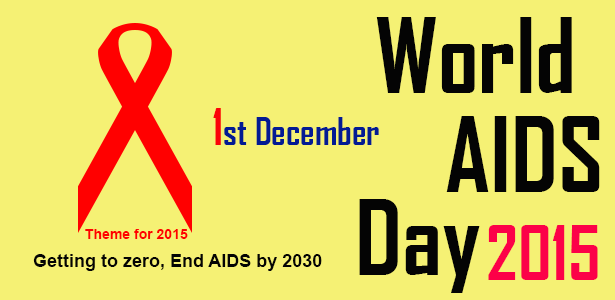Getting to zero, End AIDS by 2030
Every year on 1st December World Acquired Immuno Deficiency Syndrome (AIDS) Day is being observed to raise awareness of the pandemic caused by the spread of human immunodeficiency virus (HIV) infection.

It also seeks to remember those who have died of the disease by mourning.
The theme for year 2015 is Getting to zero, End AIDS by 2030.
Government, non-governmental organizations (NGOs), health officials and individuals around the world observe the day and often spread awareness and education on AIDS prevention and control.
Background:
World Health Organization (WHO) had designated 1st December as World AIDS Day in 1987. Since then it is observed annually and is one of the eight official global public health campaigns marked by the WHO.
Common reasons for getting infected with AIDS
Unprotected sex with an infected person.
During pregnancy from mother to child or even breastfeeding.
Through transfusion of blood. Using of hypodermic needles of infected person to other person.
Facts on AIDS
Here are some facts about AIDS in 2015 with data from the World Health Organisation, the United Nations children's agency UNICEF, and UNAIDS:
1. Globally about 36.9 million people are living with HIV including 2.6 million children.
2. An estimated 2 million were infected in 2014.
3. An estimated 34 million people have died from HIV or AIDS, including 1.2 million in 2014.
4. The number of adolescent deaths from AIDS has tripled over the last 15 years.
5. AIDS is the number one cause of death among adolescents in Africa and the second among adolescents globally.
6. In sub-Saharan Africa, the region with the highest prevalence, girls account for 7 in 10 new infections among those aged 15-19.
7. At start of 2015, 15 million people were receiving antiretroviral therapy compared to 1 million in 2001.
8. Despite widespread availability of HIV testing, only an estimated 51% of people with HIV know their status.
9. The global response to HIV has averted 30 million new HIV infections and nearly 8 million deaths since 2000.
10. In 2015, Cuba was the first country declared to have eliminated mother-to-child transmission of HIV.

Join The Discussion